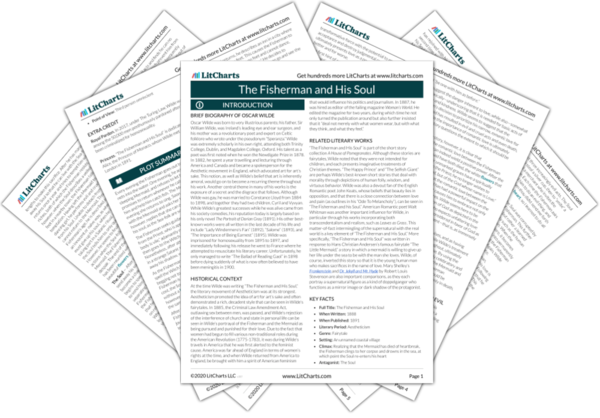The white flowers that appear at the end of the story represent the importance acceptance and are a direct rejection of the Priest’s initial vision of a judgmental God. Three years after the Fisherman and the Mermaid have been buried together in an unmarked grave, the Priest enters the chapel and finds “strange flowers” have been used to decorate the altar. He is troubled by their beauty, “and their odour was sweet in his nostrils, and he felt glad, and understood not why he was glad.” Following this, when the Priest gives mass, “he spake not of the wrath of God, but of the God whose name is Love,” and both he and the people are moved to tears. After the mass, the deacons tell him that the flowers have grown out of the ground where the Fisherman and the Mermaid are buried, and thus it seems the love between the Fisherman and the Mermaid has transformed into these flowers growing out of their grave. Furthermore, as the color white generally represents purity and innocence, the flowers also symbolize the purity of their love. Though the story professes some ambivalence about romantic love overall, the flowers undeniably speak to the transformative potential of such love. As a result of his encounter with the flowers, the Priest comes to embrace not only the love that the Fisherman and the Mermaid shared but all of the creatures in God’s kingdom. As such, the symbol of the flowers is used to convey a message about the importance of acceptance and harmony at the end of the story, suggesting that genuine love can, in turn, encourage such feelings in others.
The Flowers Quotes in The Fisherman and His Soul
And when he had robed himself with his robes, and entered in and bowed himself before the altar, he saw that the altar was covered with strange flowers that never had been seen before […] But the beauty of the white flowers troubled him, and their odour was sweet in his nostrils, and there came another word into his lips, and he spake not of the wrath of God, but of the God whose name is Love. And why he so spake, he knew not […] And in the morning […] he went forth […] and blessed the sea, and all the wild things that are in it […] All the things in God's world he blessed, and the people were filled with joy and wonder.










